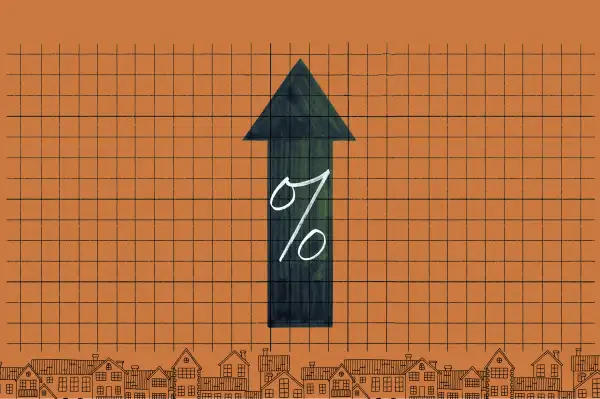Freddie Mac's 30-Year Mortgage Rate Edges Closer to 6%

This week’s average mortgage rates are up again. The 30-year fixed-rate mortgage increased to 5.81%, up 0.03 percentage points from last week, according to Freddie Mac.
This is the third week in a row that the 30-year rate has moved higher and is now almost 3% higher than it was at this time last year.
Additionally, "Fixed mortgage rates have increased by more than two full percentage points since the beginning of the year," Sam Khater, Freddie Mac's chief economist, said in a statement.
This, combined with skyrocketing home prices, has made the recent sales of existing homes decline, Khater added. However, "Many potential homebuyers are still interested in purchasing a home, keeping the market competitive but leveling off the last two years of red-hot activity," he said.
Rates are higher for all other loan categories as well. The 15-year fixed-rate mortgage is averaging 4.92%, up 0.11 percentage points from last week. The rate on a 5/1 adjustable rate loan increased 0.08 percentage points to 4.41%.
What’s next for mortgage rates and what does it mean for homebuyers?
Mortgage rates moved higher today, although at a more moderate pace after last week’s massive 0.55 percentage point jump.
Where mortgage rates go from here will largely depend on the success of the Federal Reserve's efforts to curb inflation, which reached a 40-year high of 8.6% in May. The unexpected increase in consumer prices led the Fed to increase the federal funds rate, or the interest rate banks charge each other for overnight loans, by 0.75 percentage points, the largest increase since 1994.
For now, mortgage rates are expected to stay above the 5% mark for the foreseeable future with the possibility of more upward movement if the Fed needs to become more aggressive in its effort to bring inflation down.
This year's significant increases in mortgage rates are challenging potential homebuyers who were already dealing with sky-high home prices. The average monthly mortgage payment on a typical home has increased 64% year-over-year, according to George Ratiu, manager of economic research at Realtor.com. That means a typical buyer will have to spend an additional $800-plus per month to finance a home.
The effect of higher rates on the housing market is becoming more evident as home buyers and sellers are adapting to a quickly-changing market. That change may not be a bad thing, though. Many economists believe that slowing demand caused by the rapid rise in mortgage rates will lead to more ‘normal’ buying and selling patterns.
"The silver lining is that housing is clearly transitioning toward a post-pandemic new normal," Ratiu said in a statement. "The move from an overheated real estate market toward a more sustainable one will take time."
More from Money:
- Best Mortgage Lenders of 2022
- Mortgage Calculator by Money
- How to Get the Lowest Mortgage Rate: A Step-by-Step Guide
Rates are subject to change. All information provided here is accurate as of the publish date.
